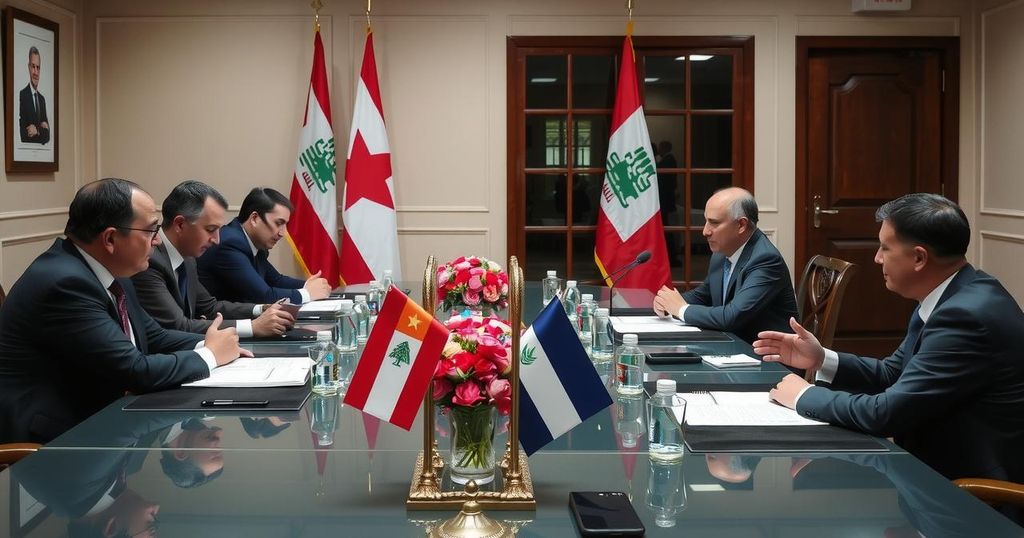Lebanese Leaders Engage in Talks Ahead of Presidential Election

Lebanese leaders are negotiating the election of a new president amid ongoing political divisions and external pressures. Army Chief Joseph Aoun is a leading candidate, but factions are hesitant to reach a consensus. The country has not had a president for over two years, complicating its recovery from an economic crisis. International envoys are urging decisive action to stabilize governance.
Lebanese political leaders convened discussions on Wednesday, just a day prior to a parliamentary session aimed at electing a new president. The country, which has endured a profound economic and political crisis, has been without a president for over two years due to deep-rooted divisions between Hezbollah, a prominent Shiite Muslim group, and its opponents. Although Army Chief Joseph Aoun is considered a potential frontrunner, the path towards a unified consensus remains ambiguous as various factions have yet to express unanimous support.
Aoun’s supporters believe he is suited to manage the military’s accelerated deployment in southern Lebanon, particularly following a November ceasefire agreement mandating that Hezbollah withdraw its forces from border regions. Historical precedents suggest that Lebanon’s fragmented political landscape typically requires consensus on a candidate prior to successful parliamentary voting, complicating current proceedings. Amidst mounting external pressures, notably from French and American envoys advocating for presidential selection, the Lebanese political apparatus faces another critical juncture.
Recent meetings, including one involving French envoy Jean-Yves Le Drian, have underscored the urgency for electing a president—a step deemed vital in stabilizing Lebanese governance. Some factions exhibit reluctance towards endorsing Joseph Aoun, with key figures and entities, such as the Free Patriotic Movement and allied groups, evaluating their stance on potential candidates. The situation is further complicated by the constitutional stipulation prohibiting the election of individuals currently holding high office.
Lebanon’s power-sharing framework necessitates that the president be a Maronite Christian, traditionally requiring backing from leading Christian parties. The ambiguous political terrain has rendered candidates like Jihad Azour and Elias Baissari as alternatives to Joseph Aoun, amid criticisms that Hezbollah has hampered past electoral efforts. Despite Hezbollah’s diminished influence following recent military setbacks, apprehensions towards any markedly opposing candidate endure.
As the Lebanese citizenry awaits the imminent parliamentary vote, hope for a benevolent and legitimate leadership persists amid a turbulent political climate, with citizens voicing their aspiration for an elected leader that represents their interests.
Lebanon is currently grappling with a significant economic and political crisis, having been without a president for over two years. The stalemate is primarily due to deep-seated divisions within the ruling class, particularly between Hezbollah and rival factions. The Lebanese political system is characterized by its power-sharing arrangement, necessitating that the president be a Maronite Christian, thus complicating the selection process during times of political strife. Additionally, the recent conflict with Israel has further weakened Hezbollah’s position, adding a layer of urgency to the current discussions surrounding the presidential election. International figures, particularly from France and the United States, are involved in pushing for political stability by advocating for the establishment of a new presidency as a means to initiate essential reforms in Lebanon.
In conclusion, Lebanon’s ongoing struggle to elect a new president highlights the complexities of its political framework, particularly amid external pressures and internal divisions. Despite the candidacy of Army Chief Joseph Aoun, consensus remains elusive, with various factions evaluating their options against a backdrop of persistent economic crisis and regional instability. The forthcoming parliamentary session represents a critical moment for Lebanon, as the future leadership could significantly impact the country’s governance and reform efforts.
Original Source: www.barrons.com






